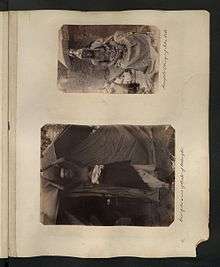Ijebu Kingdom
| Total population | |
|---|---|
| ~ 1,313,610 (2011) | |
| Regions with significant populations | |
|
Ogun State - 962,110 · Epe LGA: 213,270 · Ibeju Lekki: 138,230 | |
| Religion | |
| Christianity · Islam · Yoruba religion |
| Part of a series on |
| Yoruba people |
|---|
 |
| Subgroups |
| Music |
|
Contemporary: Folk/Traditional: |
| Notable Personalities |
| List of Yoruba people |
| Religion |
| Diaspora |
| Festivals & Events |
|
West Africa:
Diaspora:
|
Ijebu (also known as Jebu or Geebu[1]) was a Yoruba kingdom in pre-colonial Nigeria. It formed around the fifteenth century.[2] According to legend, its ruling dynasty was founded by Obanta of Ile-Ife.

The kingdom was one of the most developed in the region with a complex and highly organized government. The capital was at Ijebu Ode where the Awujale had his palace. Counterbalancing the Awujale was the Osugbo (known as the Ogboni in other parts of Nigeria), a council of all free born men that acted as the kingdom's courts. The Osugbo was divided into six groups based on rank, the highest being the iwarefa, whose head the Oliwa was the second most powerful figure in the nation. Also powerful was the Olisa who could be described as the mayor of Ijebu Ode. Like many African societies, Ijebu was also divided into three age ranks and these groups each had their own leaders. The Kingdom is made up of several towns that stretches to parts of Lagos State and borders Ondo State. These towns includes Ijebu-Remo, Ijebu-Igbo, [ Ijebu Imota] Ikorodu, Epe, Ijebu Waterside, Iwopin, Lekki in Lagos State, Ijebu-Imushin, Ijebu-Ife, Apunren, Erunwon, Isonyin, Ososa, Odogbolu and Ago-Iwoye.
The state rose in power in the eighteenth and nineteenth centuries mainly due to its important position on the trade routes between Lagos and Ibadan. The kingdom imposed sharp limits on trade insisting that all trade through the region be conducted by Ijebu merchants. The monopoly brought great wealth to the kingdom, but also annoyed Europeans.
In 1892 the British attacked Ijebu in response to its barriers on trade[3]. The British were successful and occupied the capital, burning the meeting hall of the Osugbo. The British army employed Maxim guns, according to the soldier-adventurer Frederick Lugard. In defending himself against charges of excessive death rates in Uganda from his own use of the gun, he stated: "On the West Coast, in the 'Jebu' war, undertaken by Government, I have been told 'several thousands' were mowed down by the Maxim."[4]
For several years the capital was occupied by British troops as the kingdom was annexed to the colony of Southern Nigeria. Today, it constitutes one of the traditional states of Nigeria.
The Ijebu kingdom was governed by a king and his group of elders, who usually were men of a higher status and of considerable influence. The council governed the region and had representatives of further devolved councils who no longer have any power. Since the invasion of Lord Lugard these councils have continued to meet and advise the Obanta, their power, however, is largely ceremonial since the establishment of British Rule in their protectorate. The elders were known to represent their various villages and the will of the people and are now not such a significant part in the ceremonial process.The elders were all given individual titles and the lead elder was given the title prince, although he was never to inherit the kingship, except in special circumstances. The traditional belief was similar to that of the Chinese Mandate of Heaven.
The current king is Oba Sikiru Kayode Adetona, the Awujale
References
- ↑ Robert Smith (1969). Kingdoms of the Yoruba. Methuen & Co. p. 75.
- ↑ John Lliffe. Africans: The History of a Continent. Cambridge University Press. p. 80.
- ↑ "Ijebu History". LitCaf Encyclopedia.
- ↑ Lugard, cited by Cedric Pulford: Eating Uganda: From Christianity to Conquest, 1999, p. 147
- Peter C. Lloyd, "Ijebu" African Kingships in Perspective